Randstad N.V. Bundle
How Did a Dutch Staffing Agency Become a Global HR Powerhouse?
Ever wondered how a small Dutch company revolutionized the world of work? Randstad N.V., a leading Randstad N.V. SWOT Analysis, has a fascinating origin story that spans over six decades, transforming from a local staffing agency into a global recruitment firm. From its humble beginnings, Randstad's innovative approach has reshaped how businesses find talent and how individuals find jobs. Discover the key milestones and strategic decisions that propelled Randstad to the forefront of the HR services industry.
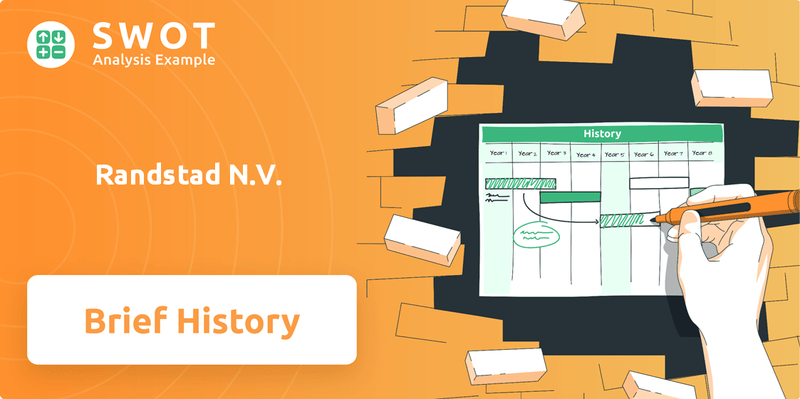
This article delves into the brief history of Randstad N.V., exploring its evolution from a Dutch multinational to a global leader. We'll examine the early days of the Randstad company, its strategic moves, and its significant impact on the staffing industry. Understanding Randstad's journey offers valuable insights for anyone interested in business strategy, market dynamics, and the future of work.
What is the Randstad N.V. Founding Story?
The story of Randstad N.V., a leading global staffing agency, began on October 29, 1960. This Dutch multinational was founded by Frits Goldschmeding, who, while still a student, saw a need for flexibility in the labor market. This brief history of Randstad N.V. highlights its humble beginnings and remarkable growth.
Goldschmeding's vision was to connect businesses needing temporary staff with individuals seeking flexible work. The initial focus was on providing temporary administrative staff, a pioneering concept at the time. This innovative approach laid the foundation for what would become one of the world's largest staffing and recruitment firms.
The company's early days were characterized by a lean startup approach, with Goldschmeding bootstrapping the business. The name 'Randstad' was chosen to reflect the highly urbanized western part of the Netherlands, symbolizing the company's initial geographical focus. The post-war economic climate, with its increasing industrialization, provided a favorable environment for the growth of such a service. To learn more about the specific audience they target, you can read about the Target Market of Randstad N.V.
Randstad history is a story of entrepreneurial vision and strategic adaptation. From its inception, the company has evolved to meet changing market demands.
- Founded on October 29, 1960, by Frits Goldschmeding.
- Initial focus on providing temporary administrative staff.
- Name 'Randstad' symbolizes the company's initial geographical focus in the Netherlands.
- The company's early business model focused on the placement of students in part-time administrative roles.
Randstad N.V. SWOT Analysis
- Complete SWOT Breakdown
- Fully Customizable
- Editable in Excel & Word
- Professional Formatting
- Investor-Ready Format
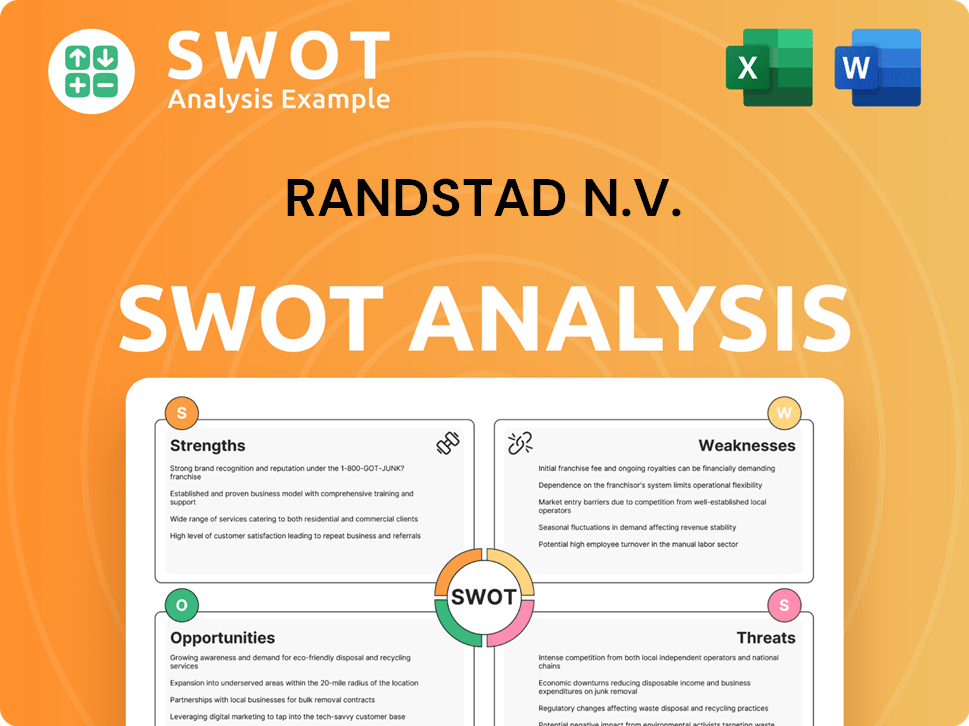
What Drove the Early Growth of Randstad N.V.?
The early growth of Randstad N.V., a prominent Dutch multinational, was marked by rapid expansion. This staffing agency quickly broadened its services beyond administrative staff, incorporating temporary workers for various industries. Early product launches targeted the industrial and technical sectors, responding to the evolving needs of the Dutch economy. The initial expansion was organic, driven by growing demand, which led to the opening of branch offices outside of Amsterdam.
A significant milestone in the
Key acquisitions began to play a role in consolidating its market position. The acquisition of Tempo-Team in 1997 significantly strengthened its presence in the Dutch market. These strategic moves helped
Throughout this period,
By the end of the 20th century,
Randstad N.V. PESTLE Analysis
- Covers All 6 PESTLE Categories
- No Research Needed – Save Hours of Work
- Built by Experts, Trusted by Consultants
- Instant Download, Ready to Use
- 100% Editable, Fully Customizable
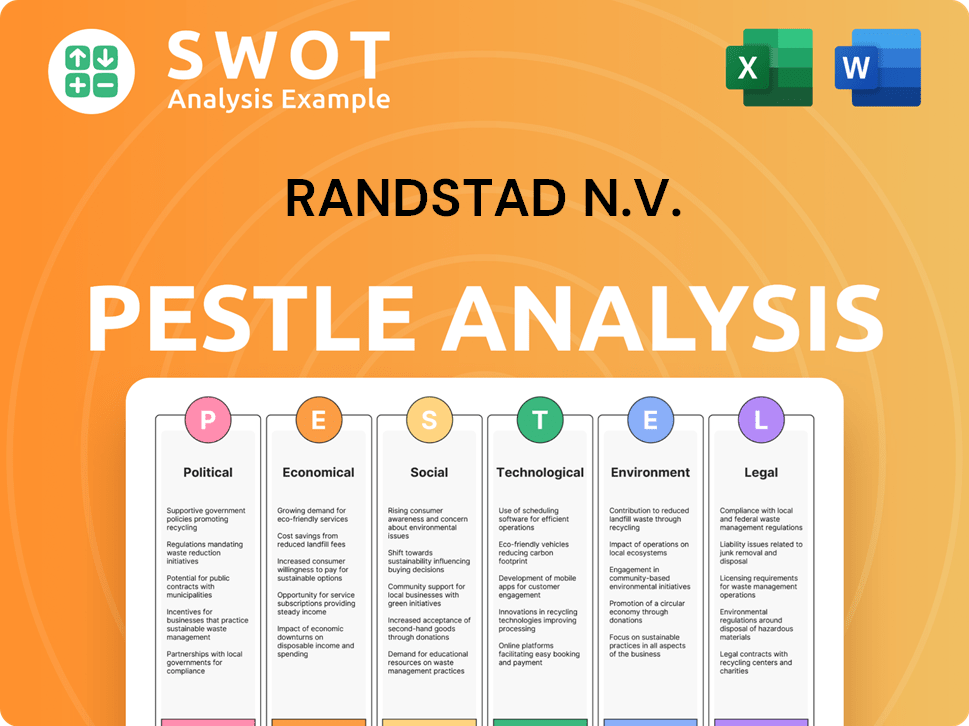
What are the key Milestones in Randstad N.V. history?
The Randstad N.V. journey, a prominent Dutch multinational and leading staffing agency, has been marked by significant milestones, innovations, and challenges that have shaped its trajectory within the recruitment firm landscape. From its inception, the Randstad company has demonstrated a commitment to adapting and evolving to meet the changing demands of the global employment market, establishing itself as a key player in the HR services sector. Understanding the Randstad history is crucial to grasping its current position and future potential.
| Year | Milestone |
|---|---|
| 1960 | Frits Goldschmeding founded the company in the Netherlands. |
| 1970s | Randstad adopted early computer technology to streamline candidate matching and administrative processes. |
| 1990s | Randstad embraced the internet, launching online job boards and digital recruitment tools. |
| 2008 | The acquisition of Vedior for approximately €3.5 billion, solidifying Randstad's position as the world's second-largest HR services provider at the time. |
| 2023 | Randstad reported a revenue of €27.1 billion, demonstrating its continued growth and market leadership. |
Randstad has consistently embraced innovation to stay ahead in the competitive staffing agency industry. Early adoption of technology, including computer systems in the 1970s and internet-based tools in the 1990s, significantly enhanced its operational efficiency and reach. These strategic moves allowed Randstad to connect with candidates and clients more effectively, setting new standards for the recruitment firm sector.
In the 1970s, Randstad utilized computer technology to streamline candidate matching and administrative tasks, enhancing efficiency.
The company was among the first in its sector to embrace the internet, launching online job boards and digital recruitment tools in the 1990s.
Randstad has consistently invested in digital transformation initiatives to improve its service offerings and operational capabilities.
Randstad leverages data analytics to enhance its recruitment processes, improve candidate matching, and provide insights to clients.
Randstad provides mobile applications for candidates and clients to access job postings, manage applications, and communicate with recruiters.
The company utilizes AI-powered tools for candidate screening, matching, and automated communication, increasing efficiency and effectiveness.
Randstad N.V. has navigated various challenges, including economic downturns and global crises. The 2008 financial crisis and the COVID-19 pandemic significantly impacted demand for temporary staffing, requiring strategic adjustments. The company's adaptability and resilience are evident in its responses, such as cost optimization and digital transformation initiatives. For a deeper dive into the company's strategic approach, consider reading about the Growth Strategy of Randstad N.V.
Randstad faced significant challenges during economic downturns, such as the 2008 financial crisis, which led to reduced demand for temporary staffing.
The COVID-19 pandemic further impacted the staffing agency, necessitating digital solutions for remote work placements and virtual recruitment.
In response to challenges, Randstad implemented restructuring efforts, focusing on cost optimization to maintain financial stability.
Randstad accelerated its digital transformation initiatives to enhance its service offerings and adapt to changing market dynamics.
The company invested heavily in reskilling and upskilling programs to meet evolving workforce demands and support its employees.
Randstad has consistently adapted its strategies to changing market dynamics and technological advancements to maintain its position.
Randstad N.V. Business Model Canvas
- Complete 9-Block Business Model Canvas
- Effortlessly Communicate Your Business Strategy
- Investor-Ready BMC Format
- 100% Editable and Customizable
- Clear and Structured Layout
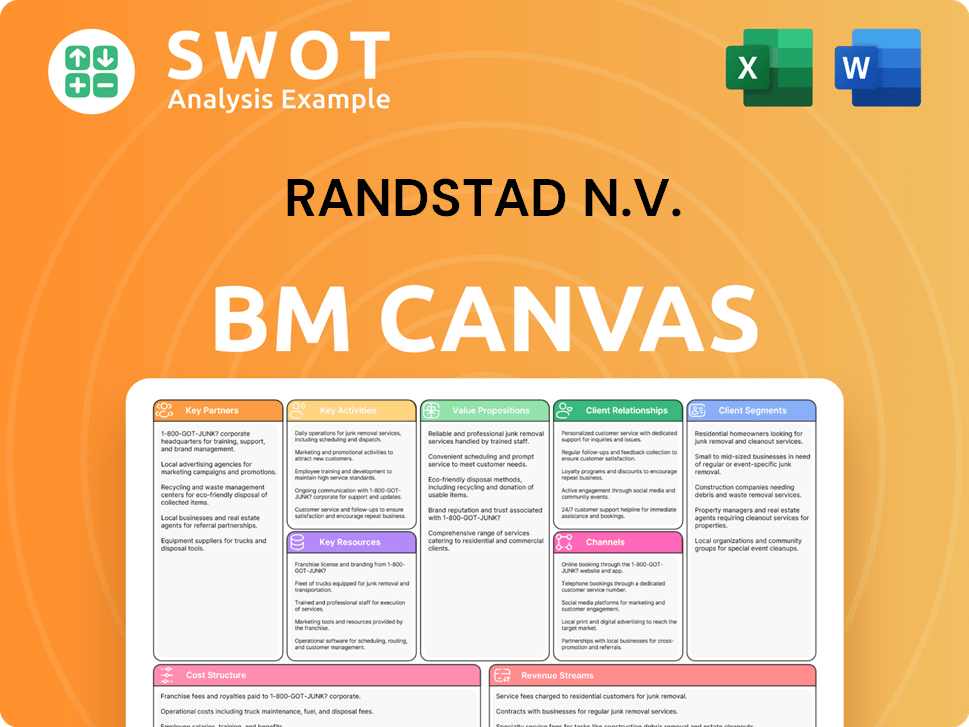
What is the Timeline of Key Events for Randstad N.V.?
The Randstad N.V. journey began in 1960 when Frits Goldschmeding established the company in the Netherlands. The Randstad history is marked by strategic expansions, technological innovations, and significant acquisitions that have shaped it into a global leader. From its early days in the Netherlands to its current global presence, Randstad company has consistently adapted to the evolving needs of the labor market, making it a key player in the staffing industry.
| Year | Key Event |
|---|---|
| 1960 | Frits Goldschmeding founded Randstad N.V. in the Netherlands. |
| 1964 | The first international office was established in Belgium. |
| 1970s | Expansion into European markets such as Germany and France, with early adoption of computer technology for recruitment. |
| 1990s | Pioneering the use of the internet for online job boards and digital recruitment. |
| 1997 | Acquisition of Tempo-Team, strengthening its position in the Dutch market. |
| 2008 | Acquisition of Vedior, making Randstad the world's second-largest HR services provider. |
| 2010s | Continued global expansion, focusing on emerging markets and specialized HR services. |
| 2020 | Navigated the challenges of the COVID-19 pandemic through accelerated digital transformation. |
| 2023 | Reported revenue of €27.6 billion, demonstrating strong financial performance. |
| 2024-2025 | Continued focus on digital innovation, talent scarcity solutions, and sustainable workforce practices. |
Randstad is investing heavily in technology, particularly in AI and machine learning, to improve matching capabilities. This includes the development of digital platforms and data analytics for more personalized HR solutions. The focus is on enhancing candidate experience and optimizing operational efficiency.
Addressing global talent scarcity is a key strategic focus. Randstad is emphasizing upskilling and reskilling initiatives to prepare the workforce for future demands. This involves helping both clients and candidates adapt to changing skill requirements.
Continued market expansion is planned, particularly in high-growth sectors and regions. Randstad is also emphasizing sustainability and social responsibility in its operations. These efforts align with the company's commitment to being a 'true partner' to clients and candidates.
In 2023, Randstad reported revenues of €27.6 billion, demonstrating its strong financial position. The company's forward-looking approach, driven by digital capabilities and global reach, reflects the founding vision of creating a flexible and efficient labor market.
Randstad N.V. Porter's Five Forces Analysis
- Covers All 5 Competitive Forces in Detail
- Structured for Consultants, Students, and Founders
- 100% Editable in Microsoft Word & Excel
- Instant Digital Download – Use Immediately
- Compatible with Mac & PC – Fully Unlocked
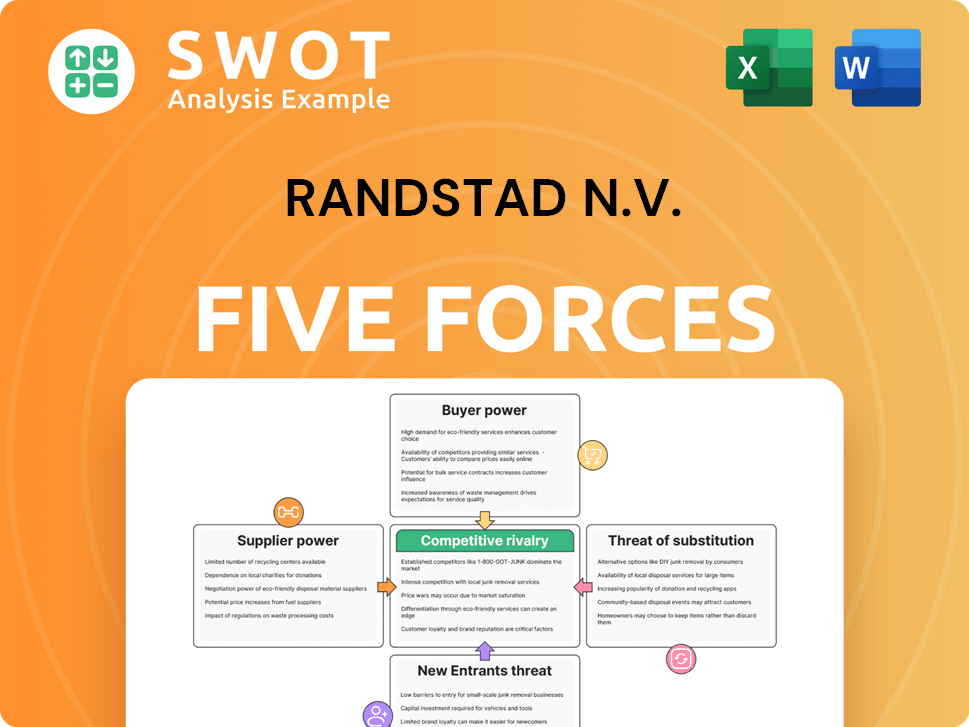
Related Blogs
- What is Competitive Landscape of Randstad N.V. Company?
- What is Growth Strategy and Future Prospects of Randstad N.V. Company?
- How Does Randstad N.V. Company Work?
- What is Sales and Marketing Strategy of Randstad N.V. Company?
- What is Brief History of Randstad N.V. Company?
- Who Owns Randstad N.V. Company?
- What is Customer Demographics and Target Market of Randstad N.V. Company?
Disclaimer
All information, articles, and product details provided on this website are for general informational and educational purposes only. We do not claim any ownership over, nor do we intend to infringe upon, any trademarks, copyrights, logos, brand names, or other intellectual property mentioned or depicted on this site. Such intellectual property remains the property of its respective owners, and any references here are made solely for identification or informational purposes, without implying any affiliation, endorsement, or partnership.
We make no representations or warranties, express or implied, regarding the accuracy, completeness, or suitability of any content or products presented. Nothing on this website should be construed as legal, tax, investment, financial, medical, or other professional advice. In addition, no part of this site—including articles or product references—constitutes a solicitation, recommendation, endorsement, advertisement, or offer to buy or sell any securities, franchises, or other financial instruments, particularly in jurisdictions where such activity would be unlawful.
All content is of a general nature and may not address the specific circumstances of any individual or entity. It is not a substitute for professional advice or services. Any actions you take based on the information provided here are strictly at your own risk. You accept full responsibility for any decisions or outcomes arising from your use of this website and agree to release us from any liability in connection with your use of, or reliance upon, the content or products found herein.